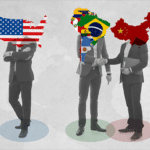
By Rodolfo/Kateri Pino – March 5, 2020
Since its inception, what is known as Canada today has found it difficult to establish guidelines to construct a collective, political, social, and, cultural imagination about the country itself. What is Canada? Where is it going? How is it evolving? And, most important: What is the real place of the original inhabitants and the rest of society?
Created in 1867 (there was no Canada before this), these questions have been constantly there, but they have not been answered seriously. Issues regarding land, its jurisdiction, its purpose and what happens on it, have frequently been in dispute and unresolved.
Some cases in recent memory include the Indian Act (1876), a law that rules Indigenous lives from birth to death. The officially failed White Paper (1969) which has been “unofficially executed” on Indigenous peoples as a State policy. The 1990 misnamed Oka Crisis where Mohawk people in Quebec defended sacred land and burial sites from developers wanting to construct a golf course. The assassination of a 22-year-old man, Colten Boushie by a White farmer “defending his land” in Saskatchewan, and many, many more. Up to the Wet’suwet’en traditional Chiefs opposing the construction of a gas pipeline through what is their unceded territory and who proposed an alternative route rejected by the company involved.
This very condensed listing is simply to stress the need for this Nation, as well as every other Nation-State where there are Indigenous Peoples, to address the crux of the problem: What is the role and responsibilities of the Sate in recognizing Indigenous Rights within its borders? How is the State complying with the Declaration on the Rights of Indigenous Peoples, the resolution that was passed in 2007 (A/61/295)? In 2018 the House of Commons voted in favour of Bill C-262, an Act to ensure that the laws of Canada are in harmony with the United Nations Declaration on the Rights of Indigenous Peoples (UNDRIP). Yet, Bill C-262 has not become law; it was blocked in the Senate by Conservative senators. The bill acknowledges the application of the UN declaration in Canada and calls for the alignment of the laws of Canada with the UN declaration; a new form of the bill is promised to be passed by the end of 2020.
RELATED CONTENT: Palestinians stand in solidarity with the Wet’suwet’en nation
How is the State seriously addressing the relationship with Indigenous Peoples in a real and respectful manner? What type of society are we offering our next generation? Is Canada only a Nation for businesses? This is the Iceberg.
After the RCMP raided Wet’suwet’en unceded territory to impose an injunction, demonstrations erupted across Canada’s expanse, carried out by both Indigenous and non-Indigenous supporters whom the dominant/corporate media called “protesters” as a way of diminishing the importance of the defense of Indigenous lands, especially at a moment in which as humanity we need to respond around the effects of climate change that threatens existence as we know it. These demonstrations have confirmed that not all society in Canada is blind to these real issues which are not only Canadian, but they exist on the entire continent and, why not, the planet.
APTN (Aboriginal Peoples Television Network) interviewed a student in a demonstration on March 4 who said, “Everyone should be responsible… so we’re just going to keep shutting down Canada.”
The report continued: “Students walked out of classes in several Canadian cities on Wednesday to stand in solidarity with Wet’suwet’en hereditary chiefs opposing the construction of a pipeline through their territory.”
In sum, the Wet’suwet’en struggle is a strong invitation to engage in a profound discussion about the present and future of Canada.
Here is a link to another good piece on this issue.
Featured image: Protesters rally in support of the Wet’suwet’en in downtown Ottawa on February 24, 2020 [File: Reuters]
OT/

Rodolfo Pino
Rodolfo Pino is an Aymara professor of Sociology, Native Studies, Religion & Culture, Political Science, Anthropology, Literature, and Spanish
University of Saskatchewan (Canada), FNUC. - Musician and Composer - Translator
Share this:
- Click to share on Twitter (Opens in new window)
- Click to share on Facebook (Opens in new window)
- Click to share on LinkedIn (Opens in new window)
- Click to share on WhatsApp (Opens in new window)
- Click to share on Reddit (Opens in new window)
- Click to share on Telegram (Opens in new window)
- Click to email a link to a friend (Opens in new window)



